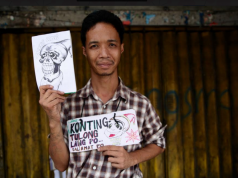
Jesus said to his disciples, “If your brother sins against you, go and tell him his fault between you and him alone. If he listens to you, you have won over your brother. If he does not listen, take one or two others along with you, so that ‘every fact may be established on the testimony of two or three witnesses.’ If he refuses to listen to them, tell the church. If he refuses to listen even to the church, then treat him as you would a Gentile or a tax collector. Amen, I say to you, whatever you bind on earth shall be bound in heaven, and whatever you loose on earth shall be loosed in heaven. Again, amen, I say to you, if two of you agree on earth about anything for which they are to pray, it shall be granted to them by my heavenly Father. For where two or three are gathered together in my name, there am I in the midst of them.”
—Matthew 18: 15-20
When two or three are gathered in God’s name, He is in our midst. But these people must have pure hearts. People who gather and pray in God’s name must not have hurt anyone or have done any offense against his/her neighbor.
In our gospel reading, Jesus gave instructions to his disciples on what to do if someone had committed sin or had done wrong to a brother or sister.
Since one decides to follow the will of God in one’s life, it is very important to follow God’s precepts and commands. To recognize one’s wrong is a humble acceptance of one’s limitations. To tell another person of his sin is also our task. The procedure is clear; the first step is to call one’s attention and tell the concerned person what he or she has done is wrong, that the person has made a wrongdoing.
After being told of the person’s sin, he or she would expectedly listen and admit the fault or sin committed. Then, it would be easier to address the issue and what can be done to rectify the wrongdoing or resolve the sin.
But what if that person doesn’t accept it? The second step is that the aggrieved person may ask two or three witnesses to testify so that the facts may be established and that the person has no other recourse but to listen to the case and make amendments. And still if that person doesn’t listen and admit to the wrongdoing, bring the case to the church (or to the community). The community will discern and make the decision. The process may be long and tedious but it has to be handled in a very compassionate way to the one who is being summoned. The church has to handle the issue with care but because of man’s pride and arrogance, the person may have difficulty in accepting and admitting the offense.
It is very important for us to recognize our faults and amend our ways, that we may have the humility to accept our failures and mistakes. With humility, we can make ourselves vulnerable to the criticism and corrections of others for our good. Because if we insist that we are always right and never accept our faults, failures, wrongdoings, mistakes and sins, then we can be disconnected from the community, from the church. We will be out of the community because we don’t submit ourselves to conversion. Accepting the reality that we commit mistakes and sins is essential before asking pardon and mercy from God.
If one is no longer part of the community, then that person cannot participate and be part of the community that gathers in God’s name. One should be a part of a community who has God in their lives because people do not live alone. A person should be part of the church, the community where God is present and alive. It is this community that would help one become a child of God.
And so, if one is not open to fraternal correction and help, then how can a person become a child of God? One has to accept and admit one’s sinfulness so that God’s merciful grace be offered and given to the person. And the church (community) one and united in the Lord can be of help in restoring the one who had committed faults or sins against God and neighbor.
If a person refuses to listen even to the church, then treat that person as not one with you. He or she cannot stay in the church for that person is detached from the church. One cannot stay in the church and divides the church.
Surely, we are assured that the mercy and love of God has no limits and bounds, but we should not take it for granted. For the church (community) can always welcome back anyone, with remorse and contrite hearts and clear consciences. Then, the church may receive those who have come back with a changed heart.
Fraternal correction may be difficult to do but we have to do it if we want to build our very own faith community. We can start with being open to commentaries and feedbacks from people. When one is open to listen, one is able to receive feedbacks freely with a more open attitude.
In our families, schools, workplaces and communities, it is very important to be open to feedbacks from our elders—parents, teachers, mentors, leaders, managers, and from everyone who cares for us. Realizing one’s mistakes and sins, fraternal correction helps us build our communities as we strive to become better and mature persons and believers.
Let us pray, reflect and ask ourselves:
Do I listen and heed the feedbacks and comments of others about me?
Am I reactive or proactive when I hear some criticism about me?
Am I willing to be corrected by others and listen to the advices and opinions of others?
Am I respectful and loving when I make fraternal corrections?
Prayer
Almighty and Loving God, thank you for calling us by our names, thank you for giving us our brothers and sisters who are our companions in this life journey. Help us to see you in others, especially those who are poor and the needy. May you accompany us in our search and journey with those who seek and look for you so that we may find you and see you in truth. This we ask through Christ our Lord who lives and reigns with you, and the Holy Spirit, one God, forever and ever. Amen.
Intention
Let us pray for all our brothers and sisters who are poor, the sick and desperate, the hopeless and broken, may the consoling hands of people who come to their rescue find the mercy and love of God in them.









